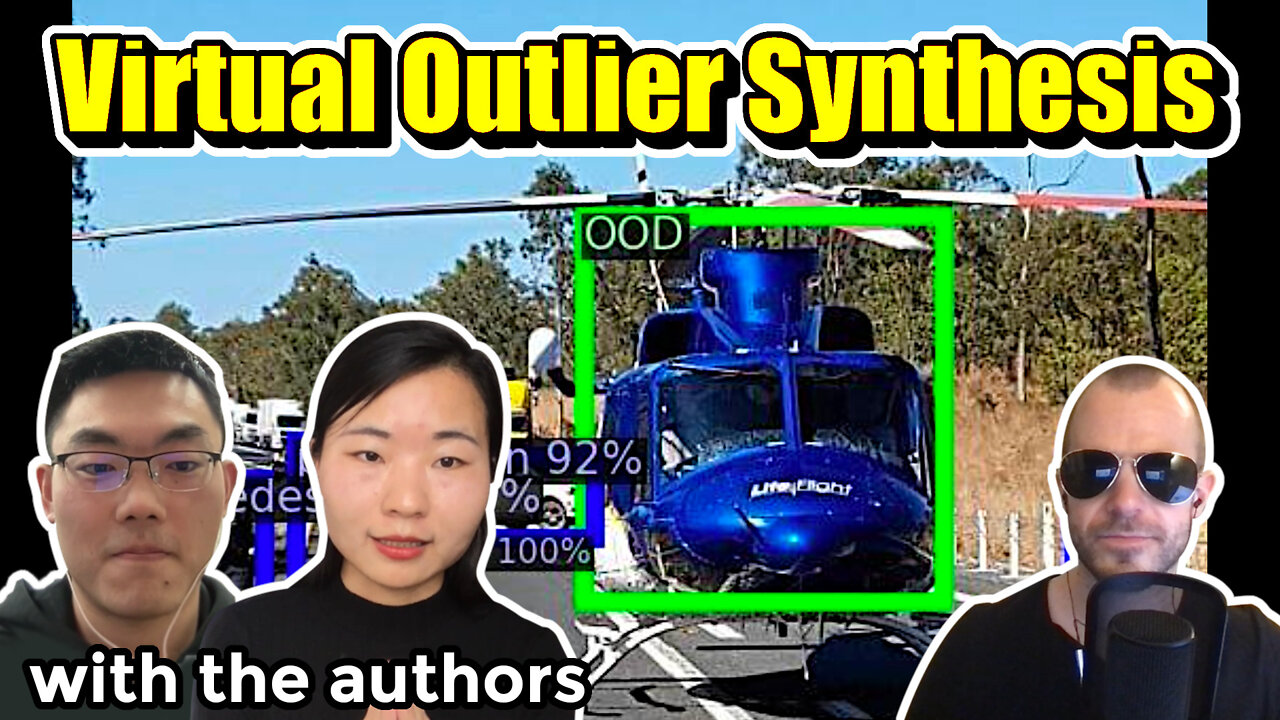Premium Only Content

Author Interview - VOS: Learning What You Don't Know by Virtual Outlier Synthesis
#deeplearning #objectdetection #outliers
An interview with the authors of "Virtual Outlier Synthesis".
Watch the paper review video here: https://youtu.be/i-J4T3uLC9M
Outliers are data points that are highly unlikely to be seen in the training distribution, and therefore deep neural networks have troubles when dealing with them. Many approaches to detecting outliers at inference time have been proposed, but most of them show limited success. This paper presents Virtual Outlier Synthesis, which is a method that pairs synthetic outliers, forged in the latent space, with an energy-based regularization of the network at training time. The result is a deep network that can reliably detect outlier datapoints during inference with minimal overhead.
OUTLINE:
0:00 - Intro
2:20 - What was the motivation behind this paper?
5:30 - Why object detection?
11:05 - What's the connection to energy-based models?
12:15 - Is a Gaussian mixture model appropriate for high-dimensional data?
16:15 - What are the most important components of the method?
18:30 - What are the downstream effects of the regularizer?
22:00 - Are there severe trade-offs to outlier detection?
23:55 - Main experimental takeaways?
26:10 - Why do outlier detection in the last layer?
30:20 - What does it take to finish a research projects successfully?
Paper: https://arxiv.org/abs/2202.01197
Code: https://github.com/deeplearning-wisc/vos
Abstract:
Out-of-distribution (OOD) detection has received much attention lately due to its importance in the safe deployment of neural networks. One of the key challenges is that models lack supervision signals from unknown data, and as a result, can produce overconfident predictions on OOD data. Previous approaches rely on real outlier datasets for model regularization, which can be costly and sometimes infeasible to obtain in practice. In this paper, we present VOS, a novel framework for OOD detection by adaptively synthesizing virtual outliers that can meaningfully regularize the model's decision boundary during training. Specifically, VOS samples virtual outliers from the low-likelihood region of the class-conditional distribution estimated in the feature space. Alongside, we introduce a novel unknown-aware training objective, which contrastively shapes the uncertainty space between the ID data and synthesized outlier data. VOS achieves state-of-the-art performance on both object detection and image classification models, reducing the FPR95 by up to 7.87% compared to the previous best method. Code is available at this https URL.
Authors: Xuefeng Du, Zhaoning Wang, Mu Cai, Yixuan Li
Links:
Merch: store.ykilcher.com
TabNine Code Completion (Referral): http://bit.ly/tabnine-yannick
YouTube: https://www.youtube.com/c/yannickilcher
Twitter: https://twitter.com/ykilcher
Discord: https://discord.gg/4H8xxDF
BitChute: https://www.bitchute.com/channel/yann...
LinkedIn: https://www.linkedin.com/in/ykilcher
BiliBili: https://space.bilibili.com/2017636191
If you want to support me, the best thing to do is to share out the content :)
If you want to support me financially (completely optional and voluntary, but a lot of people have asked for this):
SubscribeStar: https://www.subscribestar.com/yannick...
Patreon: https://www.patreon.com/yannickilcher
Bitcoin (BTC): bc1q49lsw3q325tr58ygf8sudx2dqfguclvngvy2cq
Ethereum (ETH): 0x7ad3513E3B8f66799f507Aa7874b1B0eBC7F85e2
Litecoin (LTC): LQW2TRyKYetVC8WjFkhpPhtpbDM4Vw7r9m
Monero (XMR): 4ACL8AGrEo5hAir8A9CeVrW8pEauWvnp1WnSDZxW7tziCDLhZAGsgzhRQABDnFy8yuM9fWJDviJPHKRjV4FWt19CJZN9D4n
-
![If You Smell LALALALA What CHiLi IS COOKING!!... #RUMBLETAKEOVER [Overwatch 2]](https://1a-1791.com/video/s8/1/e/s/X/3/esX3u.0kob-small-If-You-Smell-LALALALA-What-.jpg) LIVE
LIVE
CHiLi XDD
2 hours agoIf You Smell LALALALA What CHiLi IS COOKING!!... #RUMBLETAKEOVER [Overwatch 2]
417 watching -
 LIVE
LIVE
Delnorin Games
3 hours ago🔴 Live - Star Citizen
489 watching -
 1:39:44
1:39:44
HELMET FIRE
4 hours agoDEADROP IS BACK!
66.7K6 -
 10:03
10:03
Tundra Tactical
6 hours ago $1.04 earnedBrandon Herrera Vies Bid for ATF Director!
35.5K5 -
 22:01
22:01
DeVory Darkins
1 day ago $3.36 earnedHakeem Jeffries SHUTS DOWN The View as Matt Gaetz Speaks out
36.4K81 -
 2:02:54
2:02:54
Mally_Mouse
5 hours agoLet's Play!! - Spicy Saturday
24K -
 1:33:06
1:33:06
Slightly Offensive
6 hours ago $2.61 earnedAre You Ready for What's Coming Next? | Just Chatting Chill Stream
42.7K29 -
 32:10
32:10
MYLUNCHBREAK CHANNEL PAGE
1 day agoThe Gate of All Nations
110K47 -
 13:07
13:07
Sideserf Cake Studio
10 hours ago $1.04 earnedIS THIS THE MOST REALISTIC SUSHI CAKE EVER MADE?
37.6K3 -
 21:08
21:08
Clownfish TV
1 day agoElon Musk Tells WotC to BURN IN HELL for Erasing Gary Gygax from DnD!
29.4K13